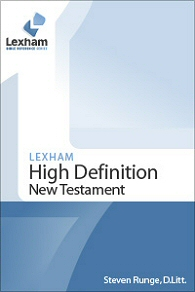The New Testament writers used a variety of literary and grammatical devices to help guide the reader. Some of these devices were intended to attract attention to important information, while others served to push less-important information into the background. Some were used simply to grab your attention, alerting you that something important or surprising was about to happen.
20 Rise and go down and accompany them without hesitation, for I have sent them.”
21 And Peter went down to the men and said “I am the one you are looking for. What is the reason for your coming?”
22 And they said, “Cornelius, a centurion, an upright and God-fearing man, who is well spoken of by the whole Jewish nation, was directed by a holy angel Elaboration to send for you to come to his house Elaboration and to hear what you have to say.”
23 So he invited them in to be his guests. The next day he rose and went away with them, and some of the brothers from Joppa accompanied him.
24 And on the following day they entered Caesarea Cornelius was expecting them and Elaboration had called together his relatives and close friends.
25 • When Peter entered, Circumstance Cornelius met him and Circumstance fell down at his feet and Sentence worshiped him.
Runge, S. E. (2008–2014). The Lexham High Definition New Testament: ESV Edition (Ac 10:20–25). Lexham Press.
Faithlife Study Bible (FSB) is your guide to the ancient world of the Old and New Testaments, with study notes and articles that draw from a wide range of academic research. FSB helps you learn how to think about interpretation methods and issues so that you can gain a deeper understanding of the text.
10:9–24 God gives Peter a vision that prepares him for the arrival of the messengers from Cornelius (vv. 7–8). The vision’s meaning and ot allusions reinforce the universal cultural scope of the Church’s message and mission.
10:20 not hesitating See note on Acts 11:12.
note on Acts 11:12.
The phrasing here could suggest either that Peter should not delay in going with the men to see Cornelius, or that Peter should go without discriminating against them (since they were Gentiles).
I have sent them The Spirit has not only sent the apostles to the Gentiles, but He has sent the Gentiles to the apostles.
10:23 entertained them as guests Peter abides by the vision’s message. Ancient Near Eastern hospitality would have required that Peter offer food to his guests.
10:25–43 This passage describes the culmination of Cornelius’ and Peter’s visions, leading to the full incorporation of a large group of non-Jewish people (Gentiles) into the Christian community.
10:25 worshiped Cornelius’ actions—kneeling to the ground and paying homage—demonstrate his respect for Peter.
Barry, J. D., Mangum, D., Brown, D. R., Heiser, M. S., Custis, M., Ritzema, E., Whitehead, M. M., Grigoni, M. R., & Bomar, D. (2012, 2016). Faithlife Study Bible (Ac 11:12). Lexham Press.
The Lexham Context Commentary: New Testament surveys each book of the New Testament at several levels—Book, Division, Section, Pericope, Paragraph, and Unit—providing contextually appropriate commentary on each level. The reader of the commentary can easily ascertain the contextual importance of any larger section, or pericope, or even a particular verse of Scripture.
Summoned to Caesarea (10:17–23)
Peter is still baffled about his strange dream, and the Spirit directs Peter’s attention to the three men from Cornelius searching for him (10:17–19). The Spirit instructs Peter to accompany the men because the Spirit has sent them (10:20–21). The three men explain their mission to Peter, including that a holy angel directed Cornelius to invite Peter to his house to speak; Peter invites the messengers to lodge with him before they leave the next day (10:22–23).
10:20 The Spirit, who informed Peter that three men are looking for him (10:18–19), further instructs Peter to accompany the men without delay or uncertainty because the Spirit has sent them.
10:21 After the Spirit instructs Peter to accompany, without hesitation, the three men who have come looking for him (10:20), Peter greets the men, identifies himself as the one they search for, and asks why they have come for him.
10:22 This verse is the response to the question Peter asked the men about the reason for their visit (10:21). The men answer by providing their master’s name, his position, his reputation among the Jewish nation, and the reason they look for Peter: Cornelius is a centurion, a just man who worships the Israelite God and who has a very good reputation among Peter’s people. They have come because a holy angel directed Cornelius to invite Peter to Cornelius’ home so that he might hear Peter speak.
10:23 This verse reveals that Peter is satisfied with the answer of Cornelius’ delegation to Peter’s question as to why they look for him (10:21–22). Peter invites the three gentile men sent by Cornelius to lodge with him in Simon’s house overnight; the following day, Peter and some believers from Joppa accompany the men to Caesarea to see Cornelius.
Peter Meets Cornelius (10:24–33)
Peter arrives at Cornelius’ home, where Cornelius has gathered some people to hear Peter; Cornelius attempts to worship Peter, but Peter stops him (10:24–26). Peter asks why he has been sent for, considering the prohibition against certain interactions between Jews and gentiles (10:27–29). Cornelius recounts his vision in response to Peter’s question about why Cornelius sent for him (10:30–33).
10:24 Peter, some believers from Joppa, and the three-man delegation that Cornelius sent to find Peter (10:22–23) arrive at Cornelius’ house in Caesarea, where his close relatives and friends, whom he has invited, are present and waiting to hear Peter speak.
10:25 When Peter arrives at Cornelius’ house in Caesarea (10:24), Cornelius greets Peter and prostrates himself before Peter in order to worship him
Mangum, D., ed. (2020). Lexham Context Commentary: New Testament (Ac 10:17–23). Lexham Press.


